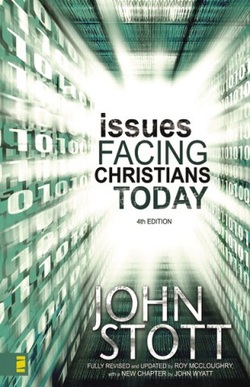
Issues Facing Christians Today
Imagine that you are eating dinner with some friends. After enjoying some delicious satay chicken the conversation moves from the latest science fiction movie to questions of real life biotechnology. And then one of your friends says to you – “you’re a Christian aren’t you, what do you think about trying to clone human life?” What would you say?
Or what if, instead of biotechnology, the conversation turned to issues of war, or caring for the environment, or homosexuality, or global poverty, or marriage and divorce, or abortion – what would you say?
And thinking more practically, should we as Christians do anything about these and other social issues in our world? Should we involve ourselves in social action – and if so, when and how?
Issues Facing Christians Today is written to address these questions. The opening three chapters serve as an introduction to the book and address general questions such as: Should Christians get involved in social
issues and social action? How can we think in a Christian way about the complex issues around us?
How can we have any influence in a pluralistic world?
The remaining chapters examine a number of specific issues including: war and peace; caring for creation; global poverty; human rights; work; business relationships; ethnic diversity; simplicity, generosity, and contentment; women, men and God; marriage, cohabitation and divorce; abortion and euthanasia; biotechnology; and, same-sex relationships.
This is the 4th edition of this book originally written by John Stott in 1984. It has been thoroughly revised and updated by Roy McCloughry (and fully endorsed by Stott). A new chapter on bio-engineering by John Wyatt has been added.
I personally found this book both informative and challenging (and I often dip back into it as an aid to help me think through a particular
issue). It consistently seeks to apply the gospel to the issues of our time and to examine the common thinking and practice of our day under the lens of Scripture. It is clear, without being simplistic. It is carefully researched and insightful. And it is full of practical and pastoral advice.
I recommend this book as a resource to help us think through what it means to live as salt and light in the world.
Imagine that you are eating dinner with some friends. After enjoying some delicious satay chicken the conversation moves from the latest science fiction movie to questions of real life biotechnology. And then one of your friends says to you – “you’re a Christian aren’t you, what do you think about trying to clone human life?” What would you say?
Or what if, instead of biotechnology, the conversation turned to issues of war, or caring for the environment, or homosexuality, or global poverty, or marriage and divorce, or abortion – what would you say?
And thinking more practically, should we as Christians do anything about these and other social issues in our world? Should we involve ourselves in social action – and if so, when and how?
Issues Facing Christians Today is written to address these questions. The opening three chapters serve as an introduction to the book and address general questions such as: Should Christians get involved in social
issues and social action? How can we think in a Christian way about the complex issues around us?
How can we have any influence in a pluralistic world?
The remaining chapters examine a number of specific issues including: war and peace; caring for creation; global poverty; human rights; work; business relationships; ethnic diversity; simplicity, generosity, and contentment; women, men and God; marriage, cohabitation and divorce; abortion and euthanasia; biotechnology; and, same-sex relationships.
This is the 4th edition of this book originally written by John Stott in 1984. It has been thoroughly revised and updated by Roy McCloughry (and fully endorsed by Stott). A new chapter on bio-engineering by John Wyatt has been added.
I personally found this book both informative and challenging (and I often dip back into it as an aid to help me think through a particular
issue). It consistently seeks to apply the gospel to the issues of our time and to examine the common thinking and practice of our day under the lens of Scripture. It is clear, without being simplistic. It is carefully researched and insightful. And it is full of practical and pastoral advice.
I recommend this book as a resource to help us think through what it means to live as salt and light in the world.

